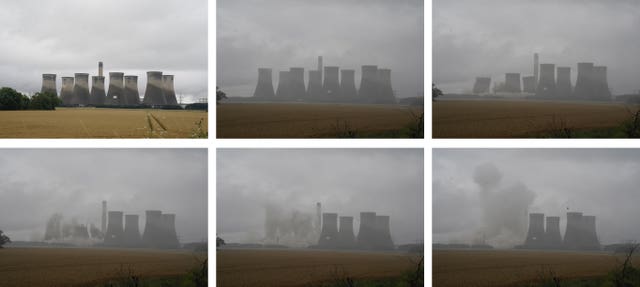Four huge cooling towers have been demolished at the former Eggborough power station in North Yorkshire.
The 300ft (90m) high structures were brought down just after 8am on Sunday.
The coal-fired power station was decommissioned in 2018 and four of its eight towers – each containing around 11,000 tonnes of reinforced concrete – were demolished as part of a plan to redevelop the site.
The cooling towers can be seen for miles around and have been a Yorkshire landmark for 50 years, along with those at the other two nearby power stations along the M62, at Drax and Ferrybridge.
Spectators dotted the fields around the rural location of the site to watch the demolition despite dismal, drizzling conditions.
The Yorkshire Day demolition was carried out by contractor DSM as police closed roads and 40 security guards patrolled a 350m exclusion zone.
DSM technical director Billy Young said: “We are delighted that all the planning and hard work that has led up to today has enabled us to have a successful demolition.
“We appreciate that a large number of Eggborough residents and businesses could have been disrupted by the work, but we have worked hard to communicate with them behind the scenes and by correspondence to minimise this in as much as practicably possible.

“We would like to thank them and the wider community for their patience so far and assure everyone that we will do all we can to minimise any further disruption.”
The 2,000 megawatt Eggborough power station started generating electricity in 1967 and produced enough to power the equivalent of Leeds and Sheffield combined, employing 300 people.
The site was acquired by the St Francis Group in 2019 which is planning an industrial and distribution park on the site once the rest of the station is demolished, including the remaining four cooling towers and the main 200m (660ft) high chimney.
The twin Ferrybridge C power station, six miles to the west, has also been decommissioned and partially demolished.
But the giant Drax power station, eight miles to the east, remains Britain’s biggest electricity producer, although it has shifted from coal to burning biomass in recent years.




Comments: Our rules
We want our comments to be a lively and valuable part of our community - a place where readers can debate and engage with the most important local issues. The ability to comment on our stories is a privilege, not a right, however, and that privilege may be withdrawn if it is abused or misused.
Please report any comments that break our rules.
Read the rules here